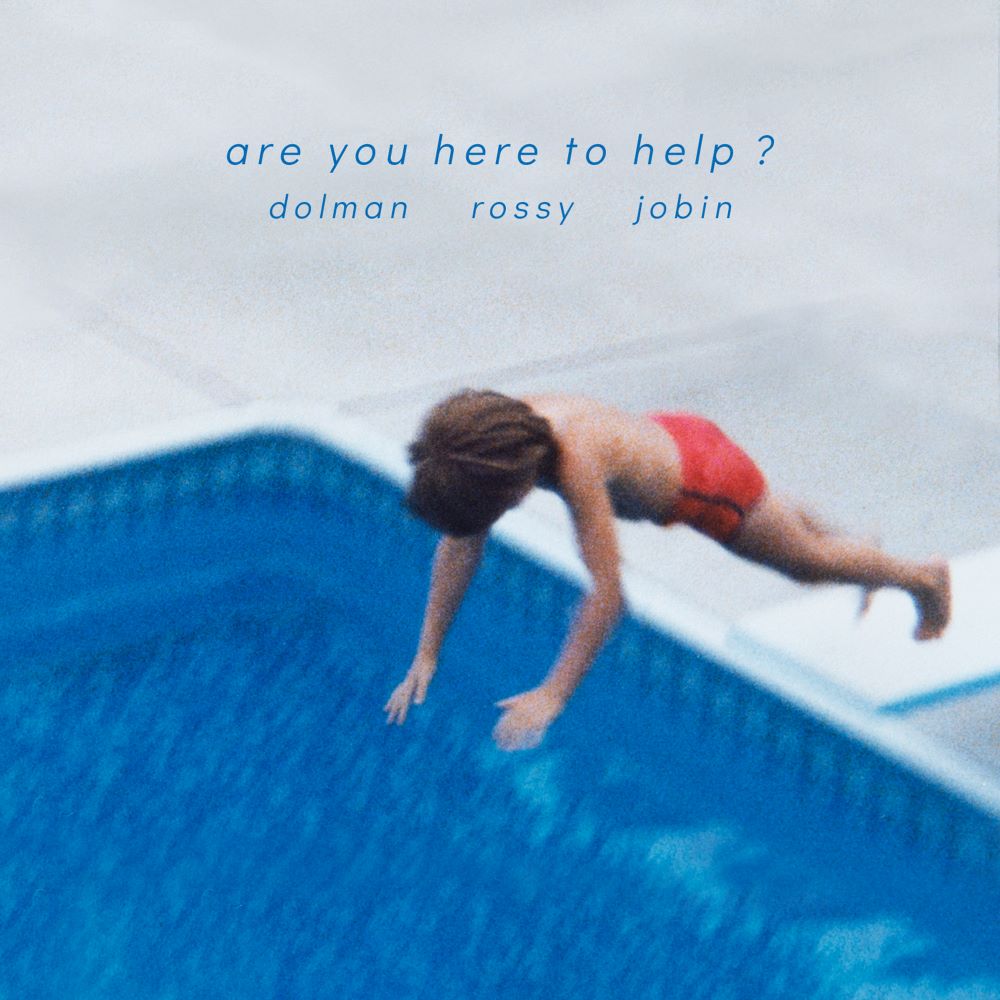DOLMAN / ROSSY / JOBIN
Are You Here To Help?
Out: March 22nd, 2022 (CD/ DL)
There's something undeniably immediate and elemental about music that employs only drums and voices—two of humankind's most universal means of expression. The striking debut album of Montreal trio Dolman / Rossy / Jobin largely eschews the raw, exuberant force one might associate with such instrumentation. Instead, the group turns toward more delicate channels to articulate a vivid awareness of their unusual ensemble's evocative potential. Led by drummer and composer Aaron Dolman, the band's lineup is completed by vocalists Sarah Rossy and Eugénie Jobin, the latter of whom occasionally plays vibraphone. Are You Here To Help? unfurls an alluringly elusive soundworld and uses a diverse array of vocal and percussive sonorities to conjure intimacy and profound vulnerability.
Dolman's compositions speak with a clear and distinct artistic voice, while leaving leaving ample room for both improvisation and silence. His writing derives its unique personality through the disarming nakedness of the band's sound palette. Rather than working to conceal its apparent limitations, he embraces his group's in-built minimalism as well as the intrinsic features of each constituent element. There's a straightforwardness to Dolman's melodic ideas; a folk-like transparency that's matched by the gentle precision of Rossy and Jobin's delivery. And while this ensures that the singing retains a certain crispness and economy, there are always deviations from the expected—sometimes in the form of subtle jazzish inflections, other times in full-on textural excursions. A little over half of the album's tracks feature original texts, which are remarkably congruent with the band's unadorned sound. Dolman's use of language is efficient yet emotive, managing to subtly reference imagery from folk songs and jazz ballads, while remaining concise and personal. His drumming is similar—spartan, sophisticated, prone to surprising twists. Often, he seems content to underline the sung phrases with tidy, elegant accompaniment punctuated with thoughtful ornamentation. However, when his playing eventually becomes more extrovert—and it does—it imbues the music with unconventional momentum, deliberate yet rousing.
Even as the three musicians drift into more nebulous territory, melody and pulse remain close at hand, lending cohesion and amiability to the hovering sonorities they generate collectively. There's a feeling of candour at every turn—no matter where the music falls along the continuum between lyricism and abstraction. Their wondrous, haunting, and thoroughly original take on the early Joni Mitchell tune “The Fiddle and the Drum”—the album's lone cover—is telling. Dolman unfolds a rousing, dynamic solo, as Jobin and Rossy intone the song in a dreamlike, staggered unison, eventually finishing the piece with a minute of faint acapella.
Photo by Pipa Jones
Part of what makes this collaboration so potent is that the singers both lead and compose for their own groups, each of which also blends exploratory minimalism and song. Sarah Rossy's 2019 album The Conclusion folds hushed yearning into strange atmospherics, and threads beautiful snaking melodies through volatile ensemble arrangements. Marc Chénard of La Scena Musical praised one of Rossy's live engagements at Montreal's Off Jazz Festival as: “Shimmering with quiet intensity, full of subtle timbral and dynamic shadings.“ “Introspective as it may seem,” he continued, “it is also adventurous, both from a melodic and harmonic angle.” Where Rossy's work seems to emerge from a similar world to Sidsel Endresen or Jenny Hval, Eugénie Jobin's equally compelling Ambroise project has shades of mutant folk such as Josephine Foster and Eric Chenaux. Ambroise's 2018 recording À la tonalité préférable du ciel on Delphine Dora's Wild Silence label was praised by French experimental music site Inactuelles as follows: “La voix d'Eugénie se fait plus fine encore, module chaque mot avec une infinie délicatesse.” Jobin is also a member of acclaimed composer and musician Isaiah Ceccarelli's new quartet, House of Gold.
Montreal's Aaron Dolman made his recorded debut in November 2019 with the pastoral quintet disc Nostalgia and Other Fantasies. Showing equal affection for improvised musics and folk idioms, the heartfelt collection swayed between evocative melodies, energetic improvisations and ethereal soundscapes. Japan's long-running Jazz Life Magazine enthused of it: “With a mixture of jazz, avant-garde, folk, and bluegrass, drummer Aaron Dolman, only in his twenties, has perfected his own unique style.”At the moment, Dolman is based in Basel, Switzerland until August 2022. There, he is participating in FocusYear, a program that assembles a small international ensemble to work and perform with a remarkable selection of visiting artists under the musical direction of the acclaimed German guitarist Wolfgang Muthspiel. The 2021/22 visiting artists include Aaron Parks, Jeff Ballard, Larry Grenadier, Guillermo Klein, Linda May Han Oh, and Becca Stevens. An in-demand accompanist, Dolman has also played alongside the likes of André White, Sasha Berliner, Jean-Michel Pilc, Kevin Dean, Mike Rud, Yesseh Furaha-Ali and Josh Rager, as well as members of Canada’s diverse folk music scene, such as Connie Kaldor and Folle Avoine. You can find his full bio here.
1. Two Boats and the Lighthouse Keeper
2. Giving (With)
3. Together
4. The Mountain Sighs a Heavy Breath
5. Borrow a Memory
6. Apart
7. Are You Here to Help? (Intro)
8. Are You Here to Help?
9. The Fiddle and the Drum*
10. When We Get There
11. To Hold Love
Aaron Dolman — drums / compositions
Sarah Rossy — voice
Eugénie Jobin — voice & vibraphone (tracks 2, 4 & 8)
Music and Lyrics by Aaron Dolman, except * by Joni Mitchell.
Produced by Aaron Dolman. Recorded and Mixed by Jon Kaspy at Studio
Dandurand in Montreal, QC. Mastered by Piper Payne at Infrasonic Sound.
Graphic Design by Anita Cazzola and Sam Boer


